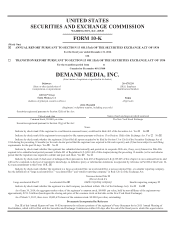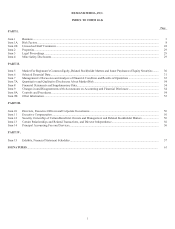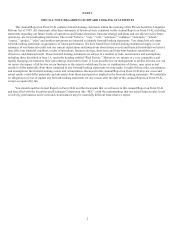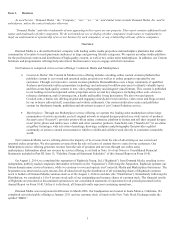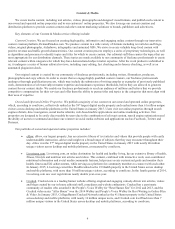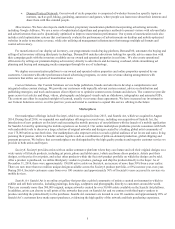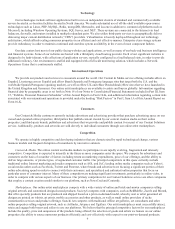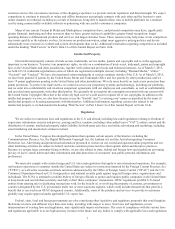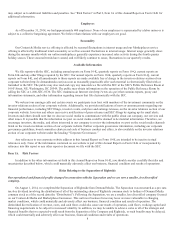Enom 2014 Annual Report Download - page 12
Download and view the complete annual report
Please find page 12 of the 2014 Enom annual report below. You can navigate through the pages in the report by either clicking on the pages listed below, or by using the keyword search tool below to find specific information within the annual report.9
Following the Separation, we and Rightside will continue to be dependent on each other for certain support services for each
respective business and may have indemnification obligations to each other with respect to such arrangements.
We entered into various agreements with Rightside in connection with the Separation, including a transition services agreement
(the “Transition Services Agreement”), a separation and distribution agreement, a tax matters agreement (the “Tax Matters
Agreement”), an intellectual property assignment and license agreement, and an employee matters agreement. These agreements
govern our relationship with Rightside subsequent to the Separation. If we are required to indemnify Rightside for certain liabilities
and related losses arising in connection with any of these agreements or if Rightside is required to indemnify us for certain liabilities
and related losses arising in connection with any of these agreements and does not fulfill its obligations to us, we may be subject to
substantial liabilities, which could have a material adverse effect on our financial position.
Additionally, although Rightside will be contractually obligated to provide us with certain services during the term of the
Transition Services Agreement, we cannot assure you that these services will be performed as efficiently or proficiently as they were
performed prior to the Separation. When Rightside ceases to provide services pursuant to the Transition Services Agreement, our costs
of procuring those services from third parties may increase. In addition, we may not be able to replace these services in a timely
manner or enter into appropriate third-party agreements on terms and conditions comparable to those under the Transition Services
Agreement. To the extent that we require additional support from Rightside not addressed in the Transition Services Agreement, we
would need to negotiate the terms of receiving such support in future agreements.
If there is a determination that the Separation is taxable for U.S. federal income tax purposes, then we and our stockholders that
are subject to U.S. federal income tax could incur significant U.S. federal income tax liabilities.
We received a private letter ruling from the Internal Revenue Service (“IRS”), together with an opinion of Latham & Watkins
LLP, tax counsel to us (the “Tax Opinion”), substantially to the effect that, among other things, the Separation qualifies as a tax-free
transaction for U.S. federal income tax purposes under Sections 355 and 368(a)(1)(D) of the Internal Revenue Code of 1986, as
amended (the “Code”). The private letter ruling and Tax Opinion relied on certain facts, assumptions, representations and
undertakings from us and Rightside regarding the past and future conduct of the companies’ respective businesses and other matters.
The private letter ruling did not address all the requirements for determining whether the Separation would qualify for tax-free
treatment, and the Tax Opinion, which addressed all such requirements but relied on the private letter ruling as to matters covered by
the ruling, is not binding on the IRS or the courts. Notwithstanding the private letter ruling and the Tax Opinion, the IRS could
determine on audit that the Separation should be treated as taxable if it determines that any of these facts, assumptions, representations
or undertakings is not correct or have been violated or if it disagrees with the conclusions in the Tax Opinion that are not covered by
the private letter ruling, or for other reasons, including as a result of certain significant changes in the stock ownership of us or
Rightside after the Separation.
If the Separation ultimately is determined to be taxable, we would be subject to tax as if we had sold the Rightside common
stock in a taxable sale for its fair market value, and our stockholders would be subject to tax as if they had received a taxable
distribution equal to the fair market value of Rightside’s common stock that was distributed to them. Under the Tax Matters
Agreement, we may be required to indemnify Rightside against all or a portion of the taxes incurred by Rightside in the event the
Separation were to fail to qualify for tax-free treatment under the Code. If we are required to pay any tax liabilities in connection with
the Separation pursuant to the Tax Matters Agreement or pursuant to applicable tax law, the amounts may be significant.
We have agreed to various restrictions to preserve the non-recognition treatment of the Separation, which may reduce our strategic
and operating flexibility.
To preserve the tax-free treatment to us of the Separation, under the Tax Matters Agreement that we entered into with Rightside,
we may not take any action that would jeopardize the favorable tax treatment of the Separation. The restrictions under the Tax Matters
Agreement may limit our ability to pursue certain strategic transactions or engage in other transactions that might increase the value of
our business for the two-year period following the Separation. For example, we might determine to continue to operate certain of our
business operations for the foreseeable future even if a sale or discontinuance of such business might have otherwise been
advantageous. Moreover, in light of the requirements of Section 355(e) of the Code, we might determine to forgo certain transactions,
including share repurchases, stock issuances, certain asset dispositions or other strategic transactions for some period of time
following the Separation. In addition, our indemnity obligation under the Tax Matters Agreement might discourage, delay or prevent a
change of control transaction for some period of time following the Separation.



